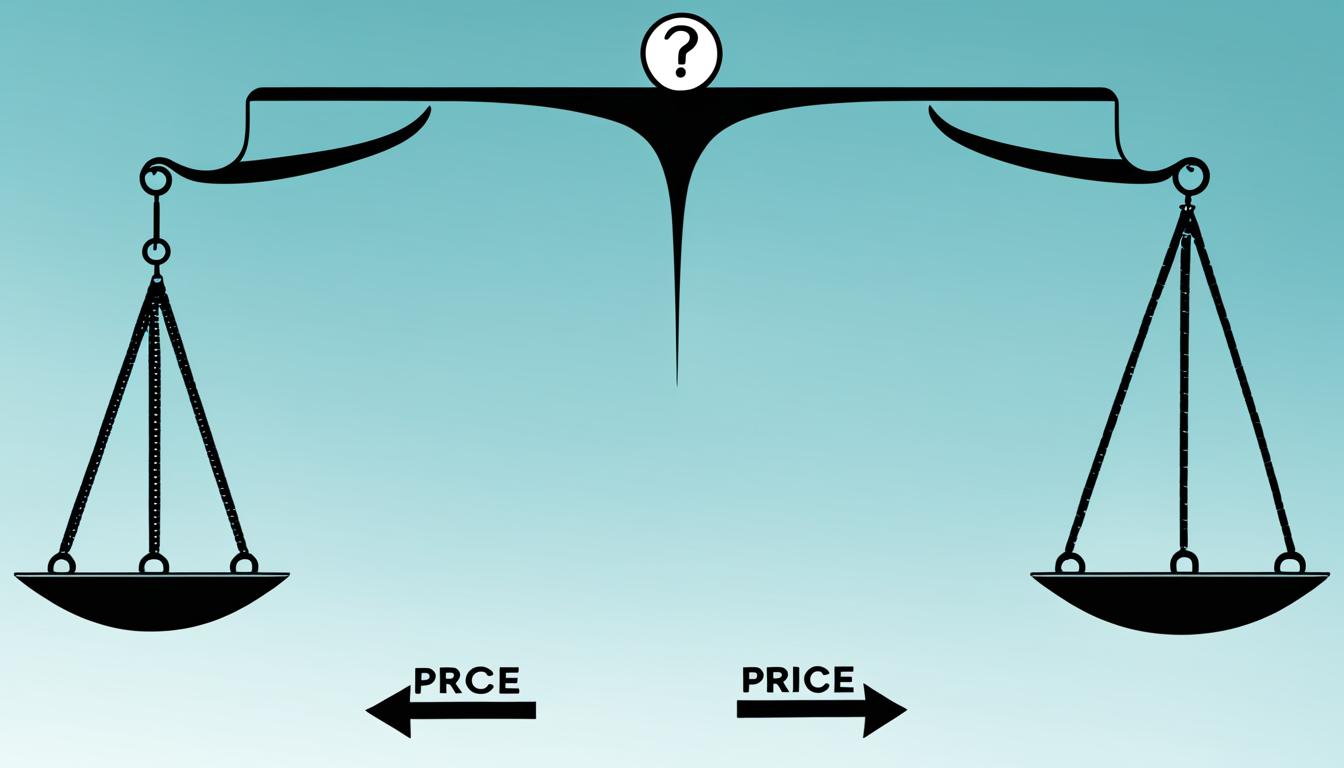Arbitrage plays a key role in trading. It’s known for making markets work better. By learning about arbitrage, traders see how to use price differences in markets to make safe money. This strategy is not just useful; it’s a major part of trading plans.
Key Takeaways
- Arbitrage exploits price discrepancies across different markets or asset forms.
- It is fundamental to market efficiency and financial theories.
- Understanding arbitrage is vital for robust trading strategies.
- Real-world examples and market analysis reinforce its practical relevance.
- Arbitrage opportunities lead to risk-free profit in trading.
What is Arbitrage?
Arbitrage is a way to make money by using price differences in different places. It’s a trading plan seen mainly in finance. It means you buy something where it’s cheap and sell it where it’s expensive. This is done at the same time to earn a profit with little risk.
Arbitrage Definition
Arbitrage definition ties closely to how markets work efficiently. It’s about buying and selling an asset at the same time to take advantage of different prices. By doing this, it helps prices stay true to their real value, keeping markets working well.
Arbitrage Opportunities
There are many arbitrage opportunities in various markets. These chances pop up from price differences between places or when markets are not working perfectly. Traders use smart software and their know-how to spot and use these chances quickly.
Arbitrage Example
Here’s a simple arbitrage example with currency: If the EUR/USD exchange rate is different in New York versus London, an arbitrageur could buy euros in one and sell in the other. They make money from the price gap without much risk.
Types of Arbitrage
There are many ways to make a profit through arbitrage. Each method takes advantage of market imperfections. We’ll look at different arbitrage strategies and what makes them stand out.
Pure Arbitrage
Pure arbitrage is all about buying low and selling high but with a twist. Imagine finding the same thing cheaper in one place and selling it for more in another. This safe way to make a profit is seen as the most straightforward arbitrage approach.
Triangular Arbitrage
This tactic is used in the currency markets. It’s about making trades between three types of money to spot pricing mistakes. A smart sequence of exchanges lets traders earn a sure profit, needing fast moves and sharp math.
Statistical Arbitrage
This strategy uses math and computers to find mispriced items. By predicting where prices will go, trades are made on probable price moves. It’s a high-tech, fast-paced way to arbitrage involving lots of data and high-speed trading.
Arbitrage in Cryptocurrency
The wild world of cryptocurrency is perfect for arbitrage. Because crypto prices change very quickly, traders can buy low on one exchange and sell high on another. This kind of trading requires quick thinking and the ability to act fast.
| Type of Arbitrage | Key Characteristics | Example Markets |
|---|---|---|
| Pure Arbitrage | Risk-free profit from price discrepancies in identical assets | Stock markets |
| Triangular Arbitrage | Profiting from discrepancies in exchange rates across three currencies | Foreign exchange markets |
| Statistical Arbitrage | Using algorithms and statistical models to predict pricing inefficiencies | Equity markets, derivatives |
| Arbitrage in Cryptocurrency | Exploiting price differences across various crypto exchanges | Cryptocurrency markets |
Understanding Arbitrage Strategy Meaning
Arbitrage is a key trading strategy. It uses market inefficiencies to gain profit. Traders tap into arbitrage strategy meaning to find price differences across markets or instruments. They aim for risk-free profits. This approach helps grasp financial markets better and seeks market efficiency.
An effective arbitrage strategy needs careful execution. Traders spot mispricings and make trades quickly. This limits market risks. Experts like Eugene Fama have highlighted its importance. Arbitrage helps correct price errors and keep markets stable.
To grasp the arbitrage strategy meaning, consider these:
- Spotting market inefficiencies: Notice short-term price differences in various markets or instruments.
- Risk management: Make fast trades to keep risks low.
- Using tech: Apply advanced technologies to find and use arbitrage chances well.
As markets change, so does arbitrage. It now uses complex models and fast trading tech. Success depends on market conditions and tech progress.
Here’s a look at key arbitrage strategy details:
| Aspect | Description |
|---|---|
| Market Inefficiency | Short-term price differences across markets or instruments |
| Execution Speed | Quick trades to reduce risk |
| Technological Dependency | Using top tools and algorithms to spot opportunities |
| Risk-Free Profit | Earning profit with minimal risk |
In conclusion, knowing the arbitrage strategy meaning is vital. It’s for those wanting effective strategies that use market inefficiencies for gains. With markets growing more complex, arbitrage remains key in finance, both past and present.
Arbitrage Trading Strategies
Arbitrage trading strategies can really boost a trader’s success. They help to make the most of market inefficiencies. However, they’re complex and need a solid understanding of the market.

Risk Arbitrage
Risk arbitrage takes place around mergers and acquisitions. It seeks to profit from price differences before a merger is finalized. Traders buy the stock of the company being acquired and short the acquirer’s stock.
This approach can be quite profitable. But, there’s a big risk if the merger does not happen.
Convertible Arbitrage
Convertible arbitrage deals with convertible bonds and the company’s stocks. The goal is to spot price anomalies between these. It is popular with hedge funds for its balance of risk and return.
By shorting the stock and holding the bond, investors aim to profit from price differences.
Market Making
Market making is crucial for keeping trading smooth. Traders buy and sell securities at the same time to use price discrepancies. It helps add liquidity to the market.
Market makers provide both buy and sell prices. They earn money from the price spread.
| Strategy | Key Focus | Risk Level |
|---|---|---|
| Risk Arbitrage | Merger and Acquisition Price Discrepancies | High |
| Convertible Arbitrage | Convertible Bonds vs. Underlying Stocks | Moderate |
| Market Making | Buy-Sell Price Spread | Low |
Conclusion
Understanding arbitrage in trading is key for success in financial markets. It helps in making profits from price differences. This ensures markets are efficient and aligned with risk-free profit goals.
Arbitrage is more than just a technique for trading. It’s a powerful structure that keeps the market fluid and stable. It helps in correcting price differences. This makes the market fair for everyone.
The role of arbitrage in different markets like stocks, foreign exchange, and cryptocurrency is significant. It shows how adaptable and important these strategies are.
Innovation in arbitrage strategies keeps up with changing markets. Financial experts and regulators need to stay alert. They must adapt to sustain arbitrage’s effectiveness. This article has shared insights from experts. It shows how vital arbitrage is for healthy financial markets.
FAQ
What is the arbitrage strategy meaning in the context of trading?
In trading, the arbitrage strategy means buying and selling an asset across different markets to use price differences. This strategy helps ensure that prices match up by the actions of traders. It’s crucial for market efficiency.
What is arbitrage?
Arbitrage is about finding and using price differences of similar financial instruments in various markets. It means buying cheaper in one place and selling for more in another. This way, traders make a profit with almost no risk.
Can you provide an arbitrage definition?
Arbitrage is making money from the price differences in two or more markets. You buy low in one market and sell high in another at the same time. This approach creates risk-free profits from market flaws.
What are arbitrage opportunities?
Arbitrage opportunities pop up when prices of alike assets differ across markets. This could happen because of changes in demand and supply, market flaws, or different conditions in markets.
Can you give an example of arbitrage?
For instance, arbitrage might involve buying a stock at a lower price on one stock exchange and quickly selling it at a higher price on another exchange. The trader earns a profit from the price gap without risk.
What are the different types of arbitrage?
Types of arbitrage include:
– Pure Arbitrage, where the same asset is bought and sold in different markets to use price gaps.
– Triangular Arbitrage, which uses three currencies and exchange rate differences.
– Statistical Arbitrage, based on math models for finding price inefficiencies.
– Arbitrage in Cryptocurrency, using price differences of digital currencies across exchanges.
How does triangular arbitrage work?
Triangular arbitrage involves three currencies and their exchange rates to make a profit. A trader swaps currency A for B, B for C, and C back to A. The aim is to profit from the differences in rates.
What is the role of arbitrage in finance?
Arbitrage keeps the financial markets efficient by fixing price inconsistencies. By doing this, it ensures an asset does not have different prices in various markets. This process helps keep markets balanced and competitive.
What are some common arbitrage trading strategies?
Popular arbitrage trading methods include:
– Risk Arbitrage, used in mergers and acquisitions for price gaps.
– Convertible Arbitrage, exploiting differences between convertible securities and stocks.
– Market Making, buying and selling at the same time to use price differences and add liquidity to the market.
How is arbitrage different in cryptocurrency markets?
Arbitrage in the crypto markets means using the price differences of digital currencies on different exchanges. The high volatility and various liquidity levels in these markets often create more frequent and profitable opportunities than traditional ones.
Why is understanding arbitrage strategy important for traders?
Knowing about arbitrage strategy helps traders spot risk-free profit chances. It’s key for keeping markets efficient. Also, it aids traders in grasping market dynamics and the needs for successful arbitrage.





